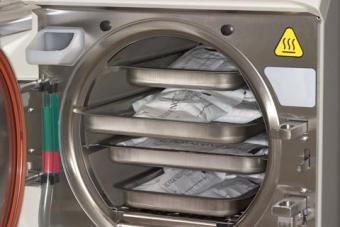
An autoclave is essential for sterilizing the tools of the trade in any tattoo shop. Tattoo guns, needles and hoses can all be sources of bacteria and infection, if not cleaned properly. Likewise, these same areas are extremely difficult to disinfect well by hand. Therefore, an autoclave should be present in every tattoo studio you visit.
What Is an Autoclave?
An autoclave is a sterilization unit that uses pressurized water vapor to disinfect objects, including medical equipment, shears, blades, containers of liquid and a host of other items. In the tattoo shop, a unit is used to sterilize tattoo guns to prevent the possible transference of bacterial and viral infections from one customer to the next.
The unit itself is constructed from strong steel to withstand the high pressure that builds up within the chamber when the machine is in use, and all of the gaskets are made to fit precisely, so no pressure can escape the unit.
There are two main types of autoclaves:

- Stove top autoclaves actually resemble a culinary pressure cooker. Each unit comes complete with a bolt-down lid and a pressure gauge on the outside. These units require an outside heat source and can be extremely dangerous in untrained hands. They should only be used by experienced professionals.
- Front loading autoclaves are more widely used for their convenience, but must also be handled with great care. The units are box-shaped and self contained, equipped with a heating unit to turn water into vapor for sterilization. The autoclave's controls allow the operator to set the desired temperature, and determine how long the machine will remain in operation. There is also a gauge to track chamber temperature/pressure.
Larger, oven-sized front loading autoclaves are also available for high volume sterilization needs such as in hospitals.
How the Unit Works
Water vapor pressurization is the key to the autoclave's sterilizing power. Water can only be heated to the boiling point in an open container before evaporation begins to take place, releasing the excess heat energy. It takes an enclosed unit like an autoclave to seal in the heat in order for steam to be further converted into water vapor, resulting in a much higher temperature inside the unit.
The pressurized heat is then forced into every nook and crevice of the items placed inside the unit, where it penetrates and destroys many types of germs including, bacteria, spores, viruses, and fungi.
Safety First and Always
Loading
Each autoclave comes with it's own loading instructions, which should be followed carefully. In general, it is important to:
- Make sure the unit is clean and free of broken glass or other debris before loading.
- Be sure that only items designed to withstand intense heat are placed inside for disinfecting. Most plastic items will likely melt under the intense heat, so check the manufacturer's directions before attempting to disinfect them.
- It is good practice to put items into a metal tray rather than setting them directly on the unit's surface.
- Be sure the door to the unit is completely latched before turning it on.
- Always double check your temperature and timer settings before starting the cycle.
Unloading

Be sure to follow any specific unloading instructions for your unit, but it's generally good procedure to:
- Always use proper protection, including wearing heat resistant rubber gloves and aprons that not only protect you from heat but can also keep hot liquids from penetrating and burning your skin in the event of an accident.
- Never open and remove items from the unit until approximately fifteen minutes after the pressure gauge has returned to zero, and never stand directly in front of the door as you open it.
- Make sure others who work in the shop know the unit is still loaded and cooling, even after the gauge returns to zero.
Check for One Every Time
When properly used, autoclaves are an important part of any tattoo shop's overall sanitation program to keep both customers and artists safe from potential infections. A person should never get tattooed at a shop that doesn't have one. A shop's reputation comes, in part, from its sterilization processes. Ensure it earns it the right reputation with an autoclave.







